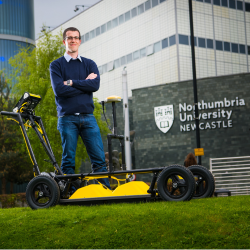-
Study
-
UCAS Clearing 2024
- Clearing Courses
- The Clearing Process
- UCAS Tariff Points
- Clearing 2024 FAQs
- Confirmation
- Clearing Virtual Event
-
Undergraduate
- Search for a Course
- Undergraduate Open Day & Events
- Application Guides
- Northumbria University UCAS Exhibitions
- Foundation Years
- Undergraduate Fees & Funding
- School & College Outreach
- Continuing Professional Development
-
Postgraduate
- Postgraduate Study Degree
- Postgraduate Research Degrees
- Postgraduate Open Days and Events
- Postgraduate Fees & Funding
- Flexible Learning
- Thinking about a Masters?
- Continuing Professional Development
- Change Direction
-
Student Life
- The Hub - Student Blog
- Accommodation
- Life in Newcastle
- Support for Students
- Careers
- Information for Parents
- Students' Union
- Northumbria Sport
-
-
International
International
Northumbria’s global footprint touches every continent across the world, through our global partnerships across 17 institutions in 10 countries, to our 277,000 strong alumni community and 150 recruitment partners – we prepare our students for the challenges of tomorrow. Discover more about how to join Northumbria’s global family or our partnerships.
View our Global Footprint-
Applying to Northumbria
- European Union
- Our London Campus
- Northumbria Pathway
- International Events
- Entry Requirements and Country Representatives
- Regional Offices
-
Northumbria Language Centre
- Faculty Requirements
- Acceptable English Requirements
- Pre-Sessional English and Study Skills
- Academic Language Skills Programmes (ALS)
-
International Fees, Funding & Scholarships
- International Undergraduate Fees
- International Undergraduate Funding
- International Masters Fees
- International Masters Funding
- International Postgraduate Research Fees
- International Postgraduate Research Funding
- International Money Matters
-
Life at Northumbria
- International student support
- Careers
-
International Mobility
- Current Northumbria Students
- Incoming Exchange Students
-
-
Business
Business
The world is changing faster than ever before. The future is there to be won by organisations who find ways to turn today's possibilities into tomorrows competitive edge. In a connected world, collaboration can be the key to success.
More on our Business Services -
Research
Research
Northumbria is a research-rich, business-focused, professional university with a global reputation for academic quality. We conduct ground-breaking research that is responsive to the science & technology, health & well being, economic and social and arts & cultural needs for the communities
Discover more about our Research -
About Us
-
About Northumbria
- Our Strategy
- Our Staff
- Place and Partnerships
- Student Profiles
- Alumni Profiles
- Leadership & Governance
- Academic Departments
- University Services
- History of Northumbria
- Contact us
- Online Shop
-
-
Alumni
Alumni
Northumbria University is renowned for the calibre of its business-ready graduates. Our alumni network has over 237,000 graduates based in 178 countries worldwide in a range of sectors, our alumni are making a real impact on the world.
Our Alumni - Work For Us
What will I learn on this module?
On this module, you will learn new field, laboratory and analytical methods in Environmental Reconstruction and apply these skills to addressing a palaeoenvironmental research question. By the end of this module, you will be able to:
* Extract sediment cores for palaeoenvironmental reconstructions and choose the best sites for analysis.
* Understand the theory and application of a range of common proxy analyses (biological, geochemical) for environmental reconstruction.
* Understand the theory and application of radiocarbon dating methods and the construction of age-depth models to establish a chronological framework to understand palaeoenvironmental change.
* Work confidently in the laboratory undertaking data analysis.
* Apply advanced statistics for the analysis of multivariate data.
* Write a report in the style of a peer-reviewed paper.
* Generate new knowledge in the study of past environmental change.
How will I learn on this module?
On this module, you will learn the theoretical and practical aspects of Environmental Reconstruction through seminars, laboratory and IT sessions, and demonstrate these learned skills in the production of a publication-style report. You will be directly guided through reading and seminars to gain theoretical knowledge, and you will put this knowledge into practice through independent, tutor-guided learning to apply
proxy-based reconstructions in field and laboratory settings to answer a palaeoenvironmental question. Staff with expertise in Environmental Reconstruction will guide you to generate and analyse your own data and you will be expected to independently conduct a literature review on an Environmental Reconstruction question of your choice. State-of-the-art laboratory facilities and specialist staff with expertise in multiproxy reconstructions will support your learning.
How will I be supported academically on this module?
You will be provided with academic support for theoretical and practical aspects of environmental reconstruction by staff with expertise in the taught proxy methods and associated statistical methods. Your assessment will be supported through seminar discussion to explore data trends and compare the limitations and strengths of Environmental Reconstruction methods. You will be supported in your final report assessment through discussion with staff members on the analysis, presentation and discussion of results generated by yourself and others.
You will be guided by technical staff for laboratory self-guided independent learning aspects of the module, including preparation of sample material and use of specialist equipment. Teaching staff operate an ‘open door’ policy for students meaning you can approach them anytime during normal office hours, or via email, to answer questions, receive feedback and support your learning on the module.
What will I be expected to read on this module?
All modules at Northumbria include a range of reading materials that students are expected to engage with. The reading list for this module can be found at: http://readinglists.northumbria.ac.uk
(Reading List service online guide for academic staff this containing contact details for the Reading List team – http://library.northumbria.ac.uk/readinglists)
What will I be expected to achieve?
Knowledge & Understanding: * MLO1. Evaluate and apply up-to-date Environmental Reconstruction methods in the field and laboratory settings. * MLO2. Synthesise and critique appropriate peer-reviewed literature in Environmental Reconstruction to identify challenges and strengths in the research discipline. Intellectual / Professional skills & abilities: * MLO3. Critically analyse a complex dataset and identify key trends using highly developed written communication skills Personal Values Attributes (Global / Cultural awareness, Ethics, Curiosity) (PVA): * MLO4. Develop a critical understanding of the role in Environmental Reconstruction in solving pressing global environmental problems.
How will I be assessed?
You will be assessed through an 8 page report in the style of a peer-reviewed publication that showcases the skills learned, specifically, theoretical aspects of the discipline, field and laboratory skills, advanced statistical applications, presentation of data, and precise written communication. You will have the opportunity for formative feedback through the submission of a written draft will be provided in advance of the final submission.
Pre-requisite(s)
None
Co-requisite(s)
None
Module abstract
In this module, you will learn and apply field and laboratory methods to answer a question in Environmental Reconstruction. You will work alongside leading experts in Environmental Reconstruction proxy methods and statistical analyses, and you will be taught to use research laboratory facilities to generate your proxy data by experts in this field. The proxy methods will allow you to address questions of past change in components of the Earth’s system, such as climate, vegetation and fire. You will learn how to create a publication-quality report that is similar to papers published in international peer-review journals. By the end of this module, you will have generated new knowledge and you will be confident in your ability to analyse complex datasets, describe and interpret key trends, and showcase higher level writing skills. These analytical and communication skills are transferable to the workplace and further academic study.
Course info
Credits 20
Level of Study Postgraduate
Mode of Study 1 year Full Time
Department Geography and Environmental Sciences
Location City Campus, Northumbria University
City Newcastle
Start September 2024
All information is accurate at the time of sharing.
Full time Courses are primarily delivered via on-campus face to face learning but could include elements of online learning. Most courses run as planned and as promoted on our website and via our marketing materials, but if there are any substantial changes (as determined by the Competition and Markets Authority) to a course or there is the potential that course may be withdrawn, we will notify all affected applicants as soon as possible with advice and guidance regarding their options. It is also important to be aware that optional modules listed on course pages may be subject to change depending on uptake numbers each year.
Contact time is subject to increase or decrease in line with possible restrictions imposed by the government or the University in the interest of maintaining the health and safety and wellbeing of students, staff, and visitors if this is deemed necessary in future.
Useful Links
Find out about our distinctive approach at
www.northumbria.ac.uk/exp
Admissions Terms and Conditions
northumbria.ac.uk/terms
Fees and Funding
northumbria.ac.uk/fees
Admissions Policy
northumbria.ac.uk/adpolicy
Admissions Complaints Policy
northumbria.ac.uk/complaints














